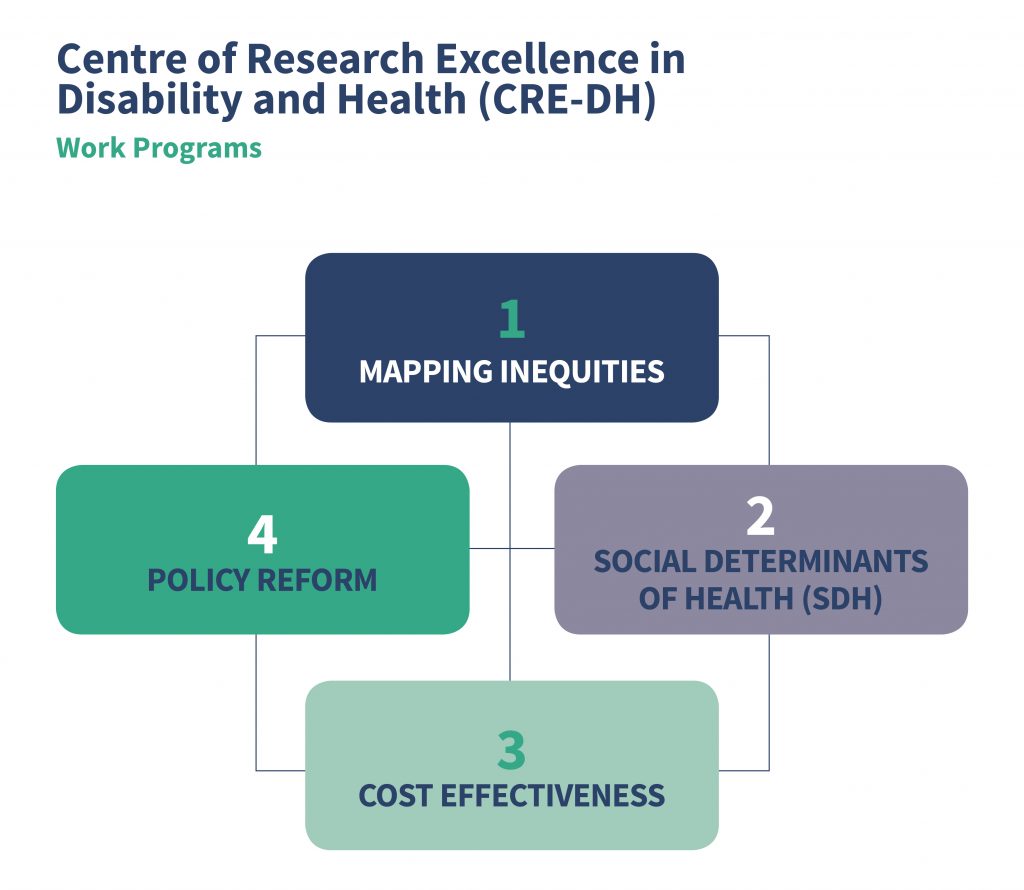The Centre of Research Excellence in Disability and Health (CRE-DH) aims to identify cost-effective policies that improve the health of people with disability in Australia.
While 15% of the world’s population have a disability, they have largely been ignored by public health research, practice and policy. Research clearly shows that on traditional indicators of health, Australians with disability fare particularly badly in global terms – they have the lowest relative income and one of the lowest levels of labour force participation of all the OECD countries. An Australian with a disability is more likely to be unemployed, live in inadequate and unaffordable housing, have not completed school, and live in financial stress. They may face discrimination in all aspects of their lives including their experience at school, with the health system, getting a job, and their family situation. All of these aspects contribute to their poorer health. Reducing these inequities would substantially improve the health of Australians with disability. Improving their health will also increase the overall health of the population, and significantly reduce health and welfare expenditure.
Solving the problem of disadvantage
Solving the consequent poor health of people with disability requires a robust knowledge base to inform policy reform. This is why the CRE-DH is important. The Centre of Research Excellence in Disability and Health is a world first; it aims to gather the evidence needed to guide social and health policy reform for people with disability in Australia. We are an interdisciplinary group of researchers with stakeholders from the health and disability sectors, state and federal governments, and disability consumer representative groups – who are embedded in the research design and development.
In collaboration with people with disability, service providers, non-government organisations and other stakeholders, we will identify the key and emerging issues affecting Australians with disability. Based on these ongoing consultations we will document how these vary between people with and without disability over time, across different geographical areas and between subgroups of the population. Our team is characterised by diversity– from public health academics to disability advocates, health economists and policy analysts–all of whom are focused on reducing disadvantage for people with disability in Australia.
Our research
We map the spatial distribution of social, economic and health inequities between people with and without disability; apply cutting-edge epidemiological methods to establish the main social determinants of health of people with disability; build the first ever cost-effectiveness model to estimate the health impacts and value for money of policy interventions for people with disability, and embed stakeholders in the research process so that they are involved in the co-production of knowledge.

Lived experience of disability
It is noteworthy that one of the two co-directors of the Centre of Research Excellence in Disability and Health, Anne Kavanagh, lives with Multiple Sclerosis and has a child who is autistic and has intellectual disability. The other co-director, Gwynnyth Llewellyn, is a family member and lifelong academic ally of people with disability. Their commitment to bringing together scholarship and personal experience of disability is an important aspect of the Centre’s vision and informs its structures and projects. This commitment is demonstrated in efforts to include researchers with lived experience of disability and provide opportunities for them to develop their research careers.
Capacity building
A major focus of the CRE-DH is to produce a skilled research workforce in disability and health. This means we train early-career researchers to build the research capacity of academics and policy-makers across sectors. By bringing together leading academics and stakeholders we aim to produce systematic and comprehensive knowledge base about the policy interventions that offer the best health benefits for people, as well as the best value for money.
Engagement
Our team produce research reports, media commentary and Issues Papers addressing gaps in policy, as well as Parliamentary Submissions and academic journal articles. These publications draw on our members’ expertise to respond to complex issues impacting the disability sector today. We use robust research and data to respond to current policy gaps and provide concrete recommendations.
